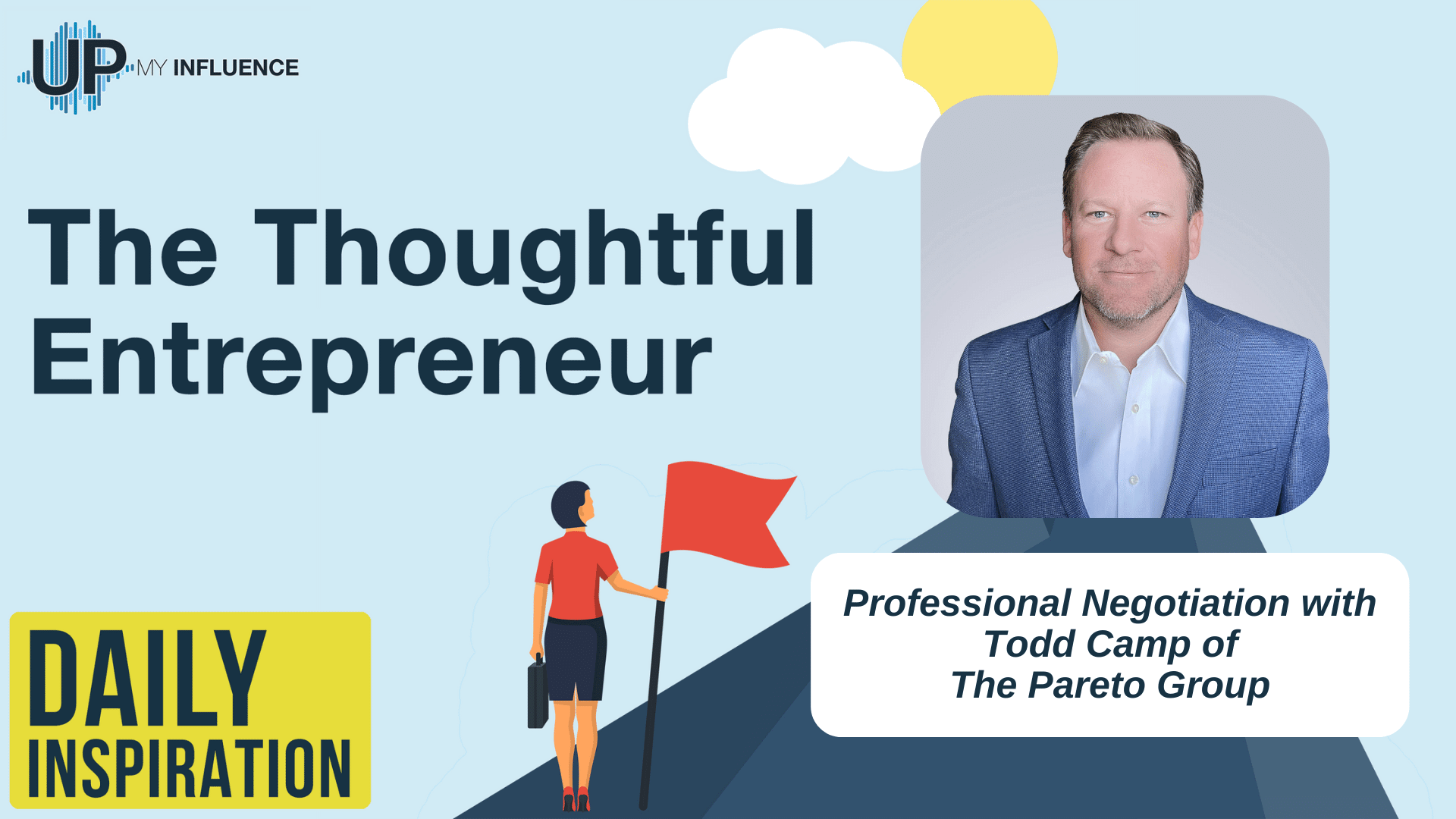THE THOUGHTFUL ENTREPRENEUR PODCAST
In this episode of the Thoughtful Entrepreneur, your host Josh Elledge speaks with the Co-Owner and CNO of Camp Negotiation Systems, Todd Camp.

Todd Camp has revolutionized the approach to this crucial aspect of business. His system assists negotiators, from startup co-founders to CEOs, in preparing, executing, and debriefing negotiations and business relationships. According to Todd, negotiation is not just about making deals; it's about making decisions.
When asked whether negotiation is more of an art or a science, Todd leans towards science, citing the role of emotion in decision-making as proven by neuroscience.
However, he acknowledges that the way individuals communicate—their mannerisms, speech pace, body language, and choice of words—is where the artistry comes into play.
Todd challenges the notion that negotiations with entities like the government are devoid of emotion. He argues that even in such scenarios, individuals are driven by emotional factors, such as how they are rewarded or graded for their performance.
For service providers, Todd emphasizes the importance of understanding that decisions are made in the client's world, not ours. He advises spending time early in relationships to truly understand the client's challenges and how you can provide solutions that benefit them.
Todd recommends asking open-ended questions that start with “what” and “how” to encourage clients to articulate their needs and vision. This approach helps uncover the true value you can provide, rather than pitching features and benefits prematurely.
Key Points from the Episode:
- Overview of the work done by Camp Negotiation Systems
- The role of emotion in decision-making and negotiation
- The importance of understanding the other party's perspective
- The art and science of negotiation
- Negotiation in government contracts and procurement
- The mindset and approach in sales conversations
- The value of asking good, open-ended questions
- Overcoming discomfort in asking probing questions
- The work and approach of Camp Negotiation Systems today
About Todd Camp:
Todd Camp is the influential owner and chief negotiation officer of Camp Systems, a Silicon Valley-based company widely recognized by major media outlets such as CNN, CNBC, The Wall Street Journal, Fortune, Harvard Business Review, Fast Company, and Inc.
In addition to his role at Camp Systems, Todd is the co-founder and partner of The Pareto Group, a renowned negotiation coaching firm catering to co-founders and executives in Silicon Valley and NYC-based venture-backed startups.
Co-author of the book “No, The Only System of Negotiation You Need For Work and Home,” Todd has conducted live coaching sessions across the United States, Canada, South America, Europe, and Asia.
Notably, he recently contributed as a speaker and sponsor at the Negotiation Leadership Conference at Harvard University, organized by the Harvard Alumni Association.
About Camp Negotiation Systems:
Camp Negotiation Systems distinguishes itself by eliminating unnecessary compromise, aiming for more profitable agreements that bolster the bottom line and foster enduring business relationships.
The system is designed to work confidentially with clients and their teams on real business deals. This strategic process enhances effectiveness in preparing for, executing, and managing critical conversations from inception to conclusion.
By prioritizing tangible results and long-term partnerships, the Camp System of Negotiation stands out in its commitment to delivering financial gains and cultivating robust and lasting connections in the business realm.
Tweetable Moments:
03:23 – “Neuroscience has proven that emotion plays a key role in every decision we make.”
09:04 – “There are four reasons why people reject: they lack the emotional vision of benefit, they lack the data to support that vision, they don't have the authority, or they're using ‘no' as a tactic.”
Apply to be a Guest on The Thoughtful Entrepreneur:
https://go.upmyinfluence.com/podcast-guest
Links Mentioned in this Episode:
Want to learn more? Check out Camp Negotiation Systems website at
Check out Camp Negotiation Systems on LinkedIn at
https://www.linkedin.com/company/campnegotiationsystems/
Check out Todd Camp on LinkedIn at
https://www.linkedin.com/in/todd-camp-6903904/
Check out Todd Camp on Twitter at
https://twitter.com/paretonegotiat1
More from UpMyInfluence:
We are actively booking guests for our The Thoughtful Entrepreneur. Schedule HERE.
Are you a 6-figure consultant? I’ve got high-level intros for you. Learn more here.
What is your #1 Lead Generation BLOCKER? Take my free quiz here.
Want to learn more about all the podcasts managed by UpMyInfluence? Opt in here.

